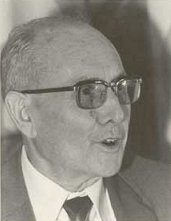Alexandre Deulofeu facts for kids
Alexandre Deulofeu i Torres (born September 20, 1903, in L'Armentera – died December 27, 1978, in Figueres) was a Catalan politician and a thinker about history. He wrote about something he called the Mathematics of History. This was a cyclical theory (meaning things happen in cycles) about how civilizations change and grow over time.
Biography
Alexandre Deulofeu was born in a town called l'Armentera in Catalonia, Spain. His father was a pharmacist. When Alexandre was three, his family moved to Sant Pere Pescador, and then to Figueres nine years later.
He went to high school in Barcelona. Later, he studied pharmacy and chemistry in Madrid, finishing his chemistry studies in Barcelona. After returning to Figueres, he became a teacher at the Institute of Figueres.
At the same time, he became very involved in politics. He was a leader for a youth group and later became a town councilor for the independent party ERC. During the Spanish Civil War, he became the mayor of Figueres by chance. While he was mayor, he worked hard to keep peace and stop people from stealing or unfairly punishing others. He also served as a health officer in the Republican Army.
On February 5, 1939, Deulofeu went into exile with the defeated republican forces. During his time in exile, he did many different jobs. He taught various subjects, experimented with farming (especially growing plants without soil, called hydroponics), worked as a bricklayer, a factory worker, and continued to write poems and stories.
He was also a musician! He played the violin and the saxophone in different music groups, playing both modern and classical music.
After returning from exile on January 22, 1947, he focused on his pharmacy work. He also continued his research and writing. Sadly, he passed away before he could finish the longer version of his main book, Mathematics of History. During his life, he was friends with famous people like Francesc Pujols and Salvador Dalí.
Theories
Deulofeu believed that civilizations and empires go through cycles, much like living beings. He thought that each civilization goes through at least three cycles, each lasting about 1700 years. Within these civilizations, empires usually last around 550 years.
He also believed that if we understood these cycles, we could change them. He hoped that by knowing how history repeats itself, people could avoid wars and instead make changes peacefully. He dreamed of a world where all people could live freely together in a "universal confederation."
Here are some of his main ideas about how people and history evolve, from his book Mathematics of History:
- All groups of people go through times when they split apart and times when they come together or form larger empires.
- The periods of splitting up usually last about 650 years. The periods of coming together (unification) last about 1050 years. So, a full cycle of change is about 1700 years long.
- During this process, people go through clear stages. At the end of a cycle, they often find themselves in a similar situation as when the cycle began.
- These cycles affect all parts of human life, not just politics. They also influence social life, art, philosophy, and science.
- All groups of people follow the same general pattern of change, but some move faster or slower depending on where they live.
- Not all people are equally creative at all times. In each cycle, there are periods when creativity is at its highest. In Europe, he believed this creativity moved from the Mediterranean (like Greece and Rome) to the west (like Spain and France), then to the British Isles, then to Germanic people, and finally to Northern and Slavic people.
- The big empires that bring people together follow similar patterns, usually lasting between five and six centuries.
- Changes in how societies are run don't happen in a straight line. Instead, they happen with steps forward and steps backward, but overall, there is progress in a certain direction. He called this "The Law of two steps forward and one backwards."
Deulofeu's ideas are similar to those of other thinkers like Oswald Spengler and Arnold J. Toynbee, who also thought that civilizations have cycles. However, Deulofeu tried to describe these cycles in a more exact, mathematical way.
Deulofeu loved visiting museums, temples, and old buildings in many countries. He believed he found the beginning of Romanesque art (a style of art and architecture from the Middle Ages) in the 9th century. He thought it started in an area between Empordà and Roussillon, which he saw as the birthplace of the second cycle of Western European civilization.
See also
 In Spanish: Alexandre Deulofeu para niños
In Spanish: Alexandre Deulofeu para niños
 | Sharif Bey |
 | Hale Woodruff |
 | Richmond Barthé |
 | Purvis Young |


